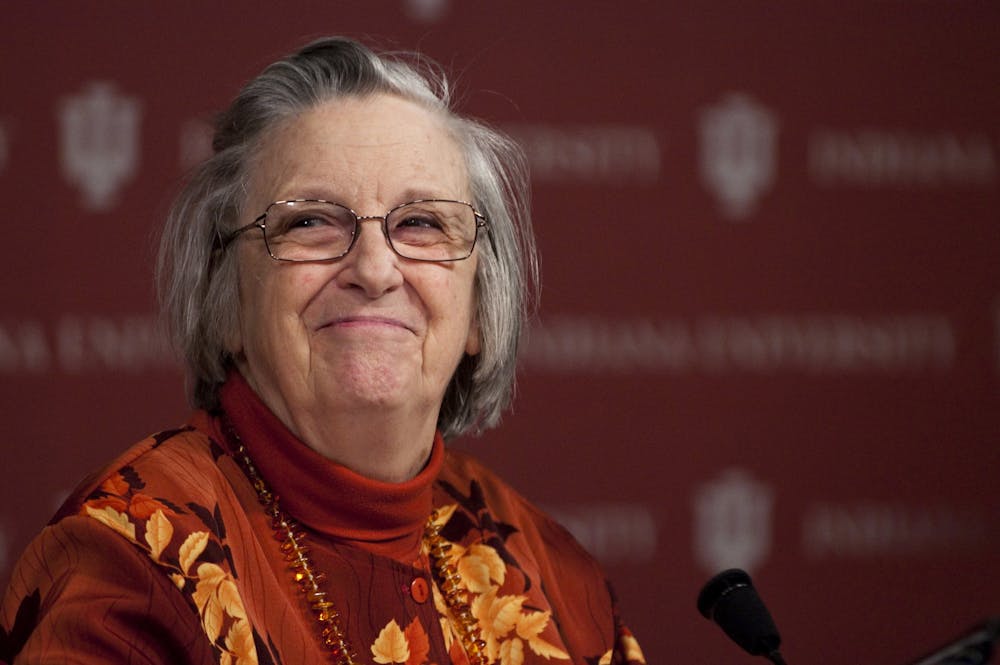Here at IU, and in society more broadly, we are surrounded by the legacies of men. IU has never had a woman president, and Indiana has never had a woman governor nor a woman U.S. senator.
It is a shame and a disservice that women’s history is not a larger part of education in the U.S., especially given how many women overcame the systemic obstacles to make a difference without any formal channels of power available to them. March is Women’s History Month — the perfect time to learn about the Hoosier women whose shoulders we stand on.
Elinor Ostrom
One of the few women whose name appears around campus is Nobel Prize winner Elinor Ostrom, who was a political science professor at IU from 1965-1991 and remained involved with IU until 2009. She won the Nobel Prize in economics in 2009 as a political scientist for her book "Governing the Commons," and she is the first and only woman to have won the prize.
Her book refuted the economic idea of the “tragedy of the commons,” or the idea that areas without formal ownership will be overconsumed and exploited because of individual self-interest and demonstrated that public spaces can be successfully managed without central authorities or privatization.
The evidence she marshaled and the influence of this work cannot be overstated. She showed that human beings are able to self-govern and effectively manage resources without authority, public or private. Her research taught us not only about economics but about human nature, and more Hoosiers and Americans should be familiar with her work.
The Henry County Female Anti-Slavery Society
HCFASS was a group of Indiana women, largely Quakers, who were committed to the end of slavery. Although women did not have the right to vote, they were determined to use their privilege as free, white women to help others become free, as exemplified by many of their statements.
This group of women was committed to activism and human rights in a time when it was uncomfortable and dangerous for anyone, especially women, to do so. They made bold statements about the role of women and women’s agency in public spaces, and showed that even with little or no access to formalized power, courage matters.
The work of women abolitionists should be celebrated more broadly, not just because of the justice of their cause but also because of the courage and cleverness it took to advance a cause without formal power.
Lillian Thomas Fox
Lillian Thomas Fox was a black journalist who became the first black writer for a white newspaper in Indiana. Hired in 1900 by the Indianapolis News, she used her column to showcase the lives of black Indianapolis residents.
As her career progressed, she traveled to cover national issues and advocate for economic independence for African Americans, and many historians credit her as integral in building a bridge between the white and black communities of Indianapolis.
Fox was also an activist. In 1903, she teamed up with Indianapolis’s first black woman physician, Beulah Wright Porter, to found the Indianapolis Women’s Improvement Club. At a time when health care was just as racially separate and unequal as everything else, her organizing via this club and others helped improve the health and lives of countless black Hoosiers and raise awareness about the issues they faced.
Her journalism and activism lifted the voices of marginalized groups, especially women of color, in a time when that was desperately needed. She should be a central figure in Indiana history, and we should carry her example with us through Women’s History Month and through our lives.
Eleanor Barker
Eleanor Barker was a leading suffragist in Indiana and an early pioneer for women in the legal profession. She had leading roles in many pro-women’s suffrage groups and was influential in bringing the victory of women’s suffrage about.
As a lawyer, she fought for women’s rights outside of suffrage as well. For example, she worked to get protection for women workers under Indiana’s industrial bureau and was successful in limiting working hours. She also fought to maintain fair prices during World War I to protect families from wartime inflation.
By the time Barker died in 1971, she had lived a full life of fighting for the rights of women Hoosiers. Women aspiring to be lawyers should look up to her and keep her example of activism and progress in mind.
There are countless women not on this list. I encourage you to take this as a starting point and use Women’s History Month to learn more about the women who made our lives, careers and social realities possible.
Kaitlyn Radde (she/her) is a sophomore studying political science. She plans to pursue a career in public interest law.






